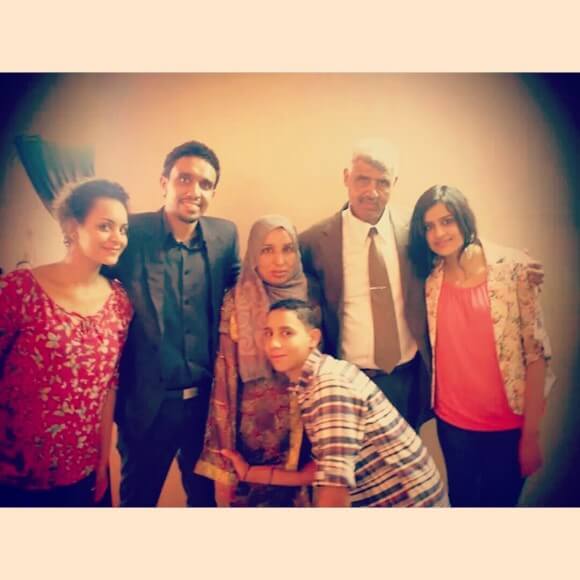I’m a third-generation Palestinian refugee, originally from Beit-Jerja, a Palestinian village in what is called now ‘Israel’. I lived my entire life in the Gaza Strip until I won a scholarship to do my BA in journalism in Turkey almost 3 years years ago. I have been living in Ankara ever since. While all my Turkish and foreigner friends visit their homes easily almost every month, I was only able to return home and see my family once, two years ago. Returning back home has become almost an intangible dream simply because I live in the Gaza Strip which has been enduring a brutal Israeli-Egyptian blockade since 2007.
I just finished my final exams yesterday. During exams, I was thinking about what I would be doing during my holiday. Whenever I asked many friends about their plans for the holiday, their reply, as predictable, was always “I will go back home. I miss family so much”. The hardest part is when they ask me, “what about you?”. This question feels like somebody slapping me or stabbing my heart as it is not even a choice to go where my family and friends are and where I spent the most beautiful and painful moments of my life. So I sigh, feeling unable to utter a word as a response. But then this question always leads to a political conversation about the complex and bitter reality of our people in the Gaza Strip, the biggest open prison on this planet. Then I end it on a positive note saying, “One day, there will be no longer an Israeli occupation. One day, I will book my ticket just like any ordinary human being whenever I can, fly to Palestine International Airport and enjoy the warmth of being around my parents and friends for a while, and then return to continue studying”.
While writing this, I recall the bittersweet memories of my last visit to Gaza, a visit that was a challenge in itself. My family didn’t want me to visit them. Of course they did miss me. However, they knew how unbearable and risky the situation was at Rafah border, the only exit for 1.8 million living in the Gaza Strip. They knew that if I made it into Gaza without being deported from Cairo Airport, I would not be able to leave again to Turkey. However, I was very homesick and I decided to disobey them and challenge those inhumane borders that disconnect us. I booked my ticket to Cairo International after a long process of trying to get an Egyptian visa to make sure that Egypt would allow me to enter their territories without being deported back to Turkey, a humiliating experience that other Palestinian friends of mine endured following their arrival in Cairo Airport.
In Ataturk International airport in Istanbul, as I was checking in to fly to Cairo, the moment they learned I was from the Gaza Strip they asked me, “Where is your visa to Egypt?”. Even though I had my visa, I couldn’t but think of how inhumane this world is. How come I need a visa to get into Egypt, the only bridge to my home? When I landed in Egypt and started my 7-hour journey by car to Rafah border, I passed through many Egyptian forces checkpoints that entailed me to show my ID and be researched a thousand times. Anyway, I made it home and I spent some unforgettable times around my family and friends. However, I was always worried about the day of my departure from Rafah border.
I was supposed to stay there for two weeks, but I ended up staying for a month. I spent the last two weeks in Rafah border trying to cross but in vain. I used to leave home with my luggage soon after sunrise, and then I ended up dragging my luggage back to my family home around sunset. My dad was very anxious that my scholarship in Turkey was at risk. However, I was more fortunate than others who were stuck behind Rafah border for months. I was able to pass Rafah border after two weeks of waiting, only with help from a friend of mine who was with me in the same boat. Her family had to seek help from a person in authority who could add our names to a list for emergency cases to ease our travel.
Whenever I talk to Mama via skype, she asks me “When are you coming to Gaza? I’m missing you”. My Dad replies “We do miss you Baba, but don’t come. We don’t want you to live the same tensive experience you had in Rafah border last time”. I can’t hold my tears in such moments. To overcome this homesickness and feel closer to them, I always return to my old pictures of my family, friends and the life I miss in the Gaza Strip. As you’re reading my story, imagine how many Palestinians are enduring the same condition, if not worse due to these movement restrictions. My story is too common among Palestinians. Many families within Palestine have been disconnected for decades because parts of them live in the Gaza Strip while the rest live in West Bank.
The main issue is not about what I went through and what I am suffering now due to being physically disconnected from my homeland for a long time. I acknowledge that I am way more privileged that many other Palestinians. At least, I don’t have to manage my life according to electricity cuts. The main issue is about the illegal and brutal collective punishment polices. It is about the Rafah border crossing which symbolizes a lifeline to our people in the Gaza Strip and has been increasingly dehumanizing them since the siege was imposed. Life for our people there is getting harder and harder day after another. Hundreds of Palestinians in the Gaza Strip losing their scholarships, residence permits and even their souls at the gate of Rafah border. The question is how many dreams should vanish, how many patients should die, how many tears should be shed until Palestinians start leading an ordinary life? When will those in power take serious actions against those responsible for committing crimes against humanity, against us?



Hellish, inhuman, and criminal treatment of the indigenous and steadfast people of Palestine.
This is a tremendous essay, Tamam. Thank you very much for posting it. It’s an essay that I will pass on to the many that need to become aware, and those that refuse to do so. It’s so vital that Palestinian voices be ‘heard’ and documented.
Congratulations on your obvious talents and scholarship!
Dear Tamam,
I understand so well your bittersweet thoughts about missing home and the dangers associated with crossing the borders.
During the Cold War, it was common to be worried that one will end up behind the wrong border, unable to return to those that were left behind.
This particular nightmare, this reoccurring bad dream, is known as Sen emigranta = night dream of an emigrant.
“When will those in power take serious actions against those responsible for committing crimes against humanity, against us?”
Dear Tamam. Thank you for sharing your story with us. Israel’s actions against the Palestinian people, especially against Gaza are undoubtedly crimes against humanity; war crimes and collective punishment. They carry these crimes out with impunity and those that should take action against them actually support them. The Palestinian people are in about the most unfair and impossible situation imaginable.
We can only hope that the tide will turn, and quickly.
Your article gives an important insight into just how torturous it is to even enter and exit Gaza to visit your family, something we all just take for granted. I really cannot imagine how unbearable the situation must be for you.
Thank you for writing this. I hope it is read by as many people as possible so that they understand the misery and reality that has been inflicted on you all.
I wish you the best with your studies in journalism and hope to hear from you again
Tamam: Thank you for sharing your heart..!! I pledge to you that I want that to happen. And I will keep your story, and all the rest of the Palestinians’ plight, in the media….in whatever form I can… until it is HEARD and becomes a REALITY..!!